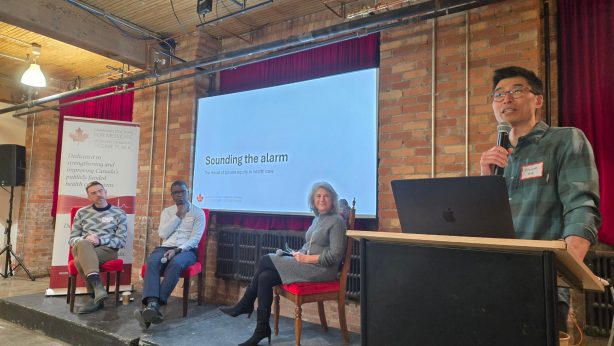Alberta whistleblowing doctors allege conflict of interest as province pushes private clinics
This week’s edition of who is saying what about public health care is compiled by Pat Van Horne.
Doctors call out authoritarian behaviour at the top of Alberta health care
“This is not trivial; this is serious stuff . . . If you have someone who is a program head in the public system, who is also a shareholder and beneficiary of work that is decanted to the private option, it seems to me that person is in an inherent conflict of interest. And if AHS ever did or still does permit it, then it strikes me as an ethical lapse. I don’t see how that would pass muster in any enterprise — public or private,” said Steven Lewis, former University of Calgary adjunct professor with more than 45 years of health-care policy and consulting, to The Tyee, January 8, 2024
Infighting blamed on Alberta government’s rush to privatize
“I can’t believe we’re not (in Edmonton) . . . I can’t believe that we had to leave Edmonton, leave Alberta, leave Canada. But we weren’t given an alternative. We weren’t given another option,” said Dr. Daniel O’Brien, one of only three doctors in northern Alberta with the specialized skills to perform certain types of complex sinus and skull-base surgeries, to The Tyee, January 9, 2024
Biden gives ok to Florida to import Canadian meds, but will Canada allow it?
“This is effectively a raid on Canada’s drug supply… It would be a significant issue if this were allowed to happen, but I don’t think it will… I think this is more about very strange U.S. politics than it is about a serious proposal that would go forward,” said BC Health Minister Adrian Dix, to CBC News, January 7, 2024
Canada cannot supply drugs to U.S.: health care consultant
“I’m not surprised that Florida Gov. Ron DeSantis, currently floundering in the Republican Presidential nomination, is grandstanding as a hero helping Americans to import cheaper prescription drugs from Canada. While his motivation is personal, it’s surprising that the U.S. Food and Drug Administration (FDA) would succumb to pressure — damn the consequences.
U.S. politicians and the FDA must care that Canada just cannot supply drugs to Florida, and other U.S. states, without increasing risks of drug shortages at home. The U.S. market being 10 times bigger than Canada’s, this reckless FDA decision could harm Canadian patients and our health-care system. Fortunately, Canada signed an order a few years ago prohibiting drug exports that could lead to shortages in Canada,” wrote Rudy Fernandes, President, Global Health Strategy Inc., in a letter to the editor of the Toronto Star, January 9, 2024
Manitoba float nurses doubled since last May
“It is a bit of an effort to try and stop nurses from leaving the public system and going to the private. . . We need to be able to compete with that in order to not only keep our nurses, but so that our new grads are staying with us when they get out (of school),” said Manitoba Nurses Union President Darlene Jackson to the Winnipeg Free Press, January 8, 2024
Nova Scotia pledges to train 200 “medical responders” (not paramedics)
“The demands on our system and paramedics continue to grow and with emergency medical responders we are taking another step toward transforming emergency health services for Nova Scotians,” “We have a world-class system in our province and the addition of these new team members will allow us to enhance the care Nova Scotians have come to expect,” said Nova Scotia Health Minister Michelle Thompson, in a government news release, January 5, 2024
Meanwhile, paramedics should move beyond traditional role, says Eastern Ontario medical director
“Paramedics in Canada have evolved beyond their traditional role as mere responders to emerge as frontline care providers . . .By reducing strain on hospitals, this shift could offer a more cost-effective and efficient approach to healthcare. Paramedics, armed with enhanced skills, could deliver timely interventions at the community level, potentially averting the escalation of medical issues and decreasing the need for costly hospital admissions within our socialized health system.” — said Dr. Michael Austin, Medical Director for the Regional Paramedic Program for Eastern Ontario supporting 1500 paramedics, EMSWorld Magazine, January 4, 2024
Agreement reached with Quebec Treasury Board for health care administrative workers
“A long-awaited (tentataive)agreement has finally been reached between Quebec’s Treasury Board and three major unions concerning pay equity for thousands of clerical and administrative employees in health and social services establishments. The unions estimate the total number of employees affected to be around 30,000. These workers, 90 per cent of whom are women, stand to gain thousands of dollars as a result of an agreement recently reached to settle a series of pay equity complaints.The three unions . . . are the CSN-affiliated Fédération de la santé et des services sociaux, the Canadian Union of Public Employees (CUPE) and the Syndicat québécois des employés de service (SQEES), the latter two being affiliated with the FTQ. (As of Jan.4) they are studyin the agreement,” states a report by The Canadian Press, January 4, 2024
Nanos Survey says Northern Ontario health care workers consider quitting
“The survey confirms that workers are very unhappy around their working conditions with a profound consequence on their mental health . . . “We’re hearing from our members that many workers are breaking down crying in their cars . . .They’re crying before they go to work. They’re crying on shift and they are breaking down at home as their workplace stress bleeds into their home life,” said Sharon Richer, secretary-treasurer for the Ontario Council of Hospital Unions, at a press conference in Sudbury, covered by CBC News, January 8, 2024



